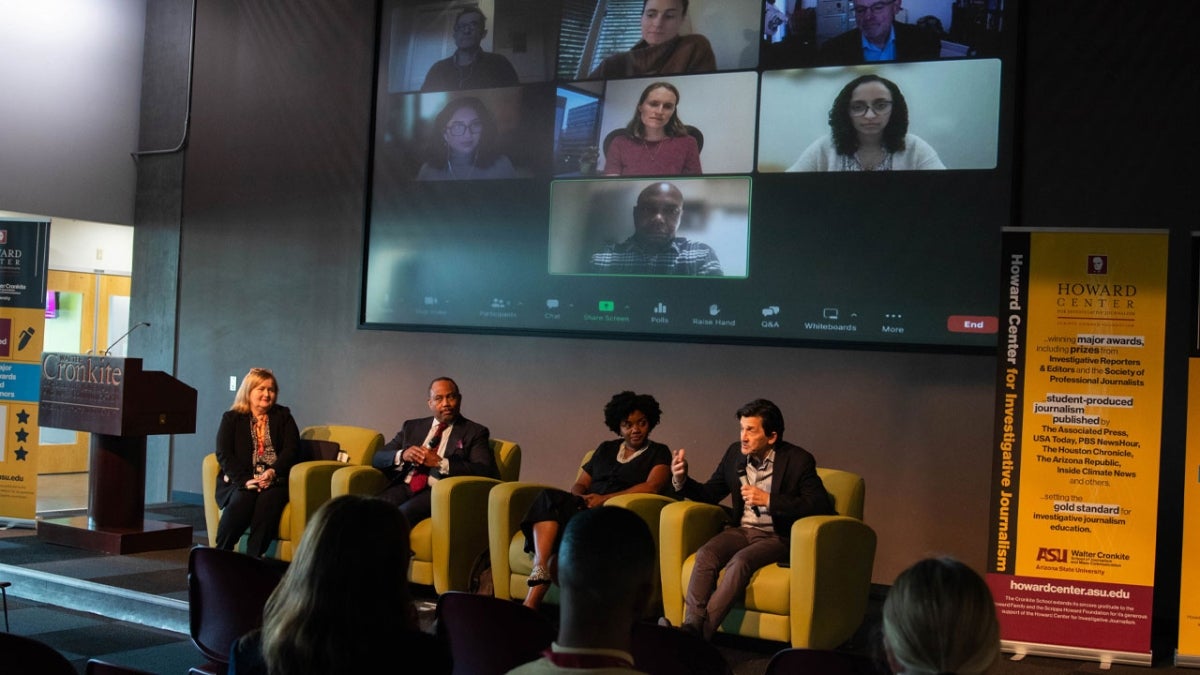Editors, journalists discuss the benefits of collegiate investigative journalism programs

The panelists gather at the Howard Center for Investigative Journalism to discuss the role of collegiate investigative programs in professional journalism and how both students and news organizations can benefit. Photo courtesy the ASU Walter Cronkite School of Journalism and Mass Communication
Students in collegiate investigative journalism programs are equipped to tackle investigations as soon as they arrive at their first job, while news organizations that partner with these programs can benefit from helping to train students and publishing their investigations.
That was the consensus during a panel discussion held Nov. 1 at Arizona State University’s Walter Cronkite School of Journalism and Mass Communication with a group of investigative editors, journalists and former Cronkite students.
The discussion, “The Role of Collegiate Investigative Programs in Professional Journalism,” examined the importance of programs that allow students to delve into investigative work and how those programs can work with professional news organizations in the U.S. and abroad. The Howard Center for Investigative Journalism at the Cronkite School hosted the event.
Participants included Ron Nixon, vice president of news and head of investigations, enterprise partnerships and grants at The Associated Press; Bill Birnbauer, founder and CEO of Democracy’s Watchdogs in Australia; Fergus Shiel, managing editor with the International Consortium of Investigative Journalists; Vernon Loeb, executive editor of Inside Climate News; and Talia Buford, talent development director with ProPublica.
The discussion also featured former Cronkite students Nicole Sadek, a Roy W. Howard Fellow with the International Consortium of Investigative Journalists; Aydali Campa, a Howard Fellow with Inside Climate News; Helen Wieffering, an investigative reporter on The Associated Press global investigations team and former Howard Fellow; and Katie Surma, another former Howard Fellow who works as an environmental law reporter with Inside Climate News.
Maud Beelman, director and executive editor with the Howard Center for Investigative Journalism at the Cronkite School, served as host and introduced the program discussion, while Cronkite School Dean Battinto L. Batts Jr. moderated the panel.
The panel examined the relationship between investigative collegiate journalism programs and professional media organizations and the advantages for students who participate in these programs.
Inside Climate News works with a number of college journalism programs around the country and has hired four Howard Fellows within the past couple of years. Loeb referred to the fellows as some of the most prepared journalists coming from college.
“They’ve prepared for the job here, they can land in a newsroom, they can formulate a story, they can report a story. And they also bring with them that kind of understanding of what an investigative story is,” he said. “It’s like riding a bicycle. Once you get that construct in your mind, you’ve got it in your mind.”
Buford referred to these programs as a “shortcut” for students who want to immediately land an investigative reporting job and pursue the type of assignments usually reserved for veteran reporters. She referred to her own experience as a reporter, where she had to work for 13 years as a daily reporter before transitioning into investigative journalism.
“You can come out the gate and say, ‘Alright, I know exactly what an accountability mindset is, I know how to do a pitch, I know how to do all these things,’” she said.
This type of experience can also lay a foundation for these students to become investigative editors, she said.
Nixon, who has judged student investigative projects for Investigative Reporters and Editors, a grassroots nonprofit organization dedicated to improving the quality of journalism, said the work produced by the Howard Center and similar programs is on par with professional news organizations as opposed to other student work.
That’s because the structure of these programs allows students to devote the time to focus on investigative projects, Nixon said.
“I think that’s a testament to the instructors there and the resources and the time that is given to the students to do this kind of work,” he said.
Media organizations have also benefited from partnering with college investigative programs by working with students and publishing their investigations.
ProPublica has partnered with college classes that have worked on investigative stories and has sent reporters to help the students shepherd the projects through completion, Buford said.
“That is a perfect opportunity for a classroom to really do some of that hands-on learning,” she said.
Former students who sat on the panel agreed with the idea that they were able to step into an investigative role immediately and contribute.
“It gave me the skills to come out right away doing investigative work. But more importantly, I think it gave me the ability to think like an investigative journalist,” Surma said. “Cronkite gives students both the mindset of an investigative journalist and the skills, which is a powerful thing.”
More Law, journalism and politics

Arizona secretary of state encourages students to vote
Arizona Secretary of State Adrian Fontes looked right and left, taking in the more than 100 students who gathered to hear him…

Peace advocate Bernice A. King to speak at ASU in October
Bernice A. King is committed to creating a more peaceful, just and humane world through nonviolent social change.“We cannot…

CNN’s Wolf Blitzer to receive 41st Walter Cronkite Award for Excellence in Journalism
Wolf Blitzer, the longtime CNN journalist and anchor of “The Situation Room With Wolf Blitzer,” will accept the 41st Walter…